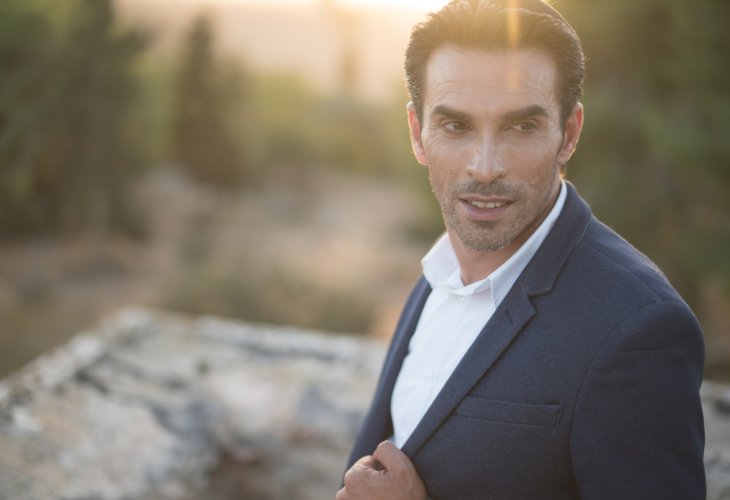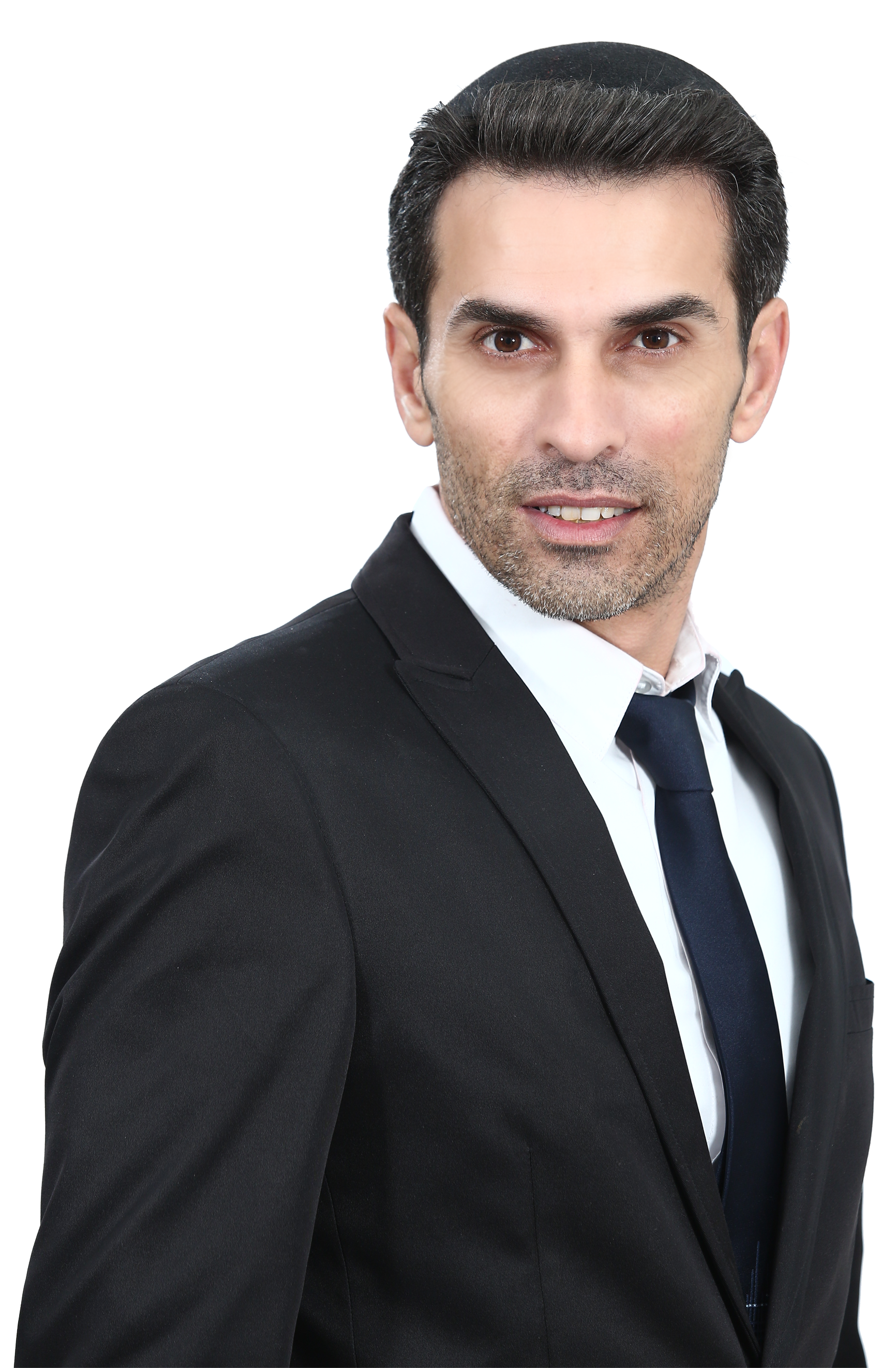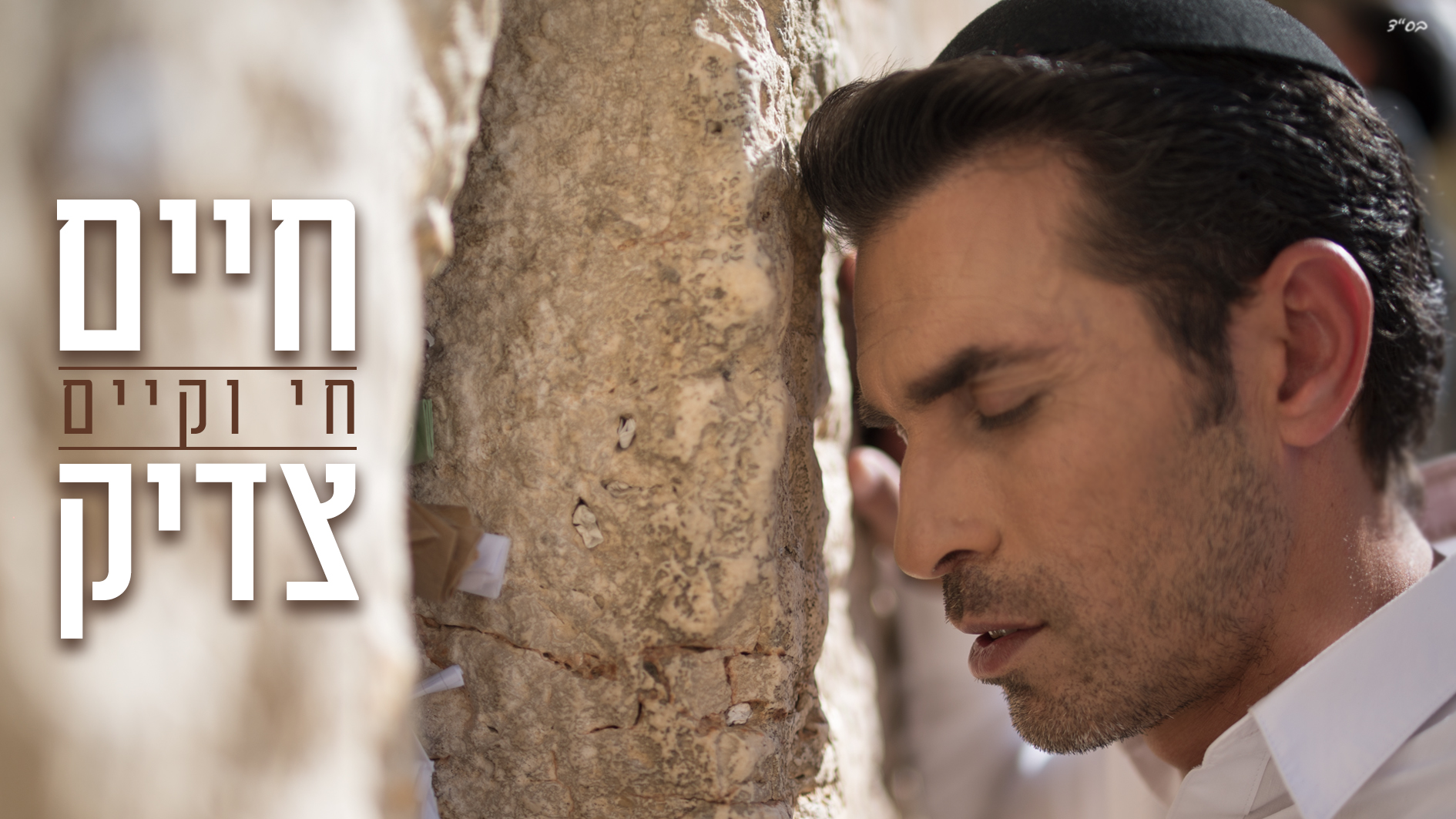Chaim Tzadik: "I Was Thrown 60 Meters in the Air. Witnesses Called ZAKA Not an Ambulance"
From childhood performances, studies in prestigious yeshivas, a prolific musical career, to a severe road accident with miraculous outcomes. This is the story of Chaim Tzadik, who experienced clinical death, journeyed to the afterlife, and returned stronger than ever.
 Chaim Tzadik (Photo: Moshe Ben Zaken)
Chaim Tzadik (Photo: Moshe Ben Zaken)"I was driving to Netivot when I lost control of the vehicle. We flipped over 4 times. We thought it was the end for us. Even after the vehicle stopped flipping, we flew about ten times from one guardrail to another," says singer Chaim Tzadik, 42, married and father of three daughters, as he begins his fascinating story, which includes a dual accident, clinical death, and a surprising return to active life.
Tzadik, a resident of Be'er Sheva where he grew up, is a beloved singer born to parents who immigrated from Tunisia as children. At age 9, he was sent to study in a yeshiva. "For years, I returned home once every three weeks for Shabbat," he recalls. "When I was 10, my parents recognized my musical talent and beautiful voice, and shortly thereafter, I began singing at family events. Things happened fast, and at age 13, I started performing at weddings and celebrations. My late father would come to the yeshiva, take me for a performance, and then return me. Years went by, and at age 20, I released my first album, 'Yonat Besora.' Many people tell me, including musicians, that they grew up on it. The album, based on Arabic music, mainly Egyptian and Lebanese, succeeded both in Israel and abroad.
"At 23, I began working on the second album, which took us into Mediterranean tunes and arrangements, and all the lyrics were from the world of Judaism. I always insisted on drawing inspiration only from holiness and not from foreign sources. We worked on the album in several studios, and enlisted the help of many talented arrangers for its production.
 (Photo: Eyal Levy)
(Photo: Eyal Levy)"We reached the final stages of the album's production, and thank God almost everything was ready. What was missing was one song to complete the album. The musical arranger and I listened tirelessly to countless drafts we received from talented people, but none 'fit the bill.' After one of these meetings, at 3:00 am, a friend and I took the arranger back to his home in Netivot, and afterward, the unbelievable happened, changing my life forever".
Suddenly I Lost Control
"On the way back to Be'er Sheva," Tzadik continues, with noticeable excitement in his voice, "a cat suddenly jumped into the road, and I immediately swerved right to avoid hitting it. To this day, I'm not sure exactly what happened, but as a result of the sharp turn, I lost control of the vehicle, and we flipped 4 times. We thought it was the end for us. Even after the car stopped flipping, we flew about ten times from one guardrail to another. It all happened in a few seconds. From a regular state of routine travel, we shifted in an instant to moments where we were trapped in a car flying through the air.
"During the flipping moments, we were in tremendous panic. Then the car stopped, and we got out without a scratch. Of course, the vehicle was crushed from every conceivable angle, but 'the sheet metal was broken, and we escaped.' It's a miracle that is hard to describe. Within a few seconds, many cars stopped next to us, saw the car, and couldn't believe their eyes - we emerged, thank God, unharmed.
"We were very confused and began to try and absorb what happened. Suddenly I realized I was without a kippah. I can't be without a kippah, and I assumed it flew off during the flip, so I returned to the car to look for it. I reached the car and sat in the passenger seat to find it. Moments later, with our car still in the middle of the road, an Audi raced toward us. The many people there signaled it to stop, but the driver didn't notice them and continued driving. When everyone saw he wasn't slowing down – they simply ran off the road, and only I, not noticing him coming, remained there alone.
"The Audi hit the car I was sitting in at incredible speed. Traffic investigators and eyewitnesses estimated it threw me 60 meters into the air. Of course, everyone there thought I was dead, so they immediately called ZAKA. Nobody even thought to call an ambulance. My miracle was that, thank God, people called an ambulance after the first accident, so there was a medical team present even during the second accident."
Prepare for the Worst
According to Tzadik, the ambulance driver at the scene quickly came to treat him and miraculously detected that he still had a pulse. The continuation of the life-saving treatment was complex, as the medical team unsuccessfully tried to extricate him from the vehicle. "After a few minutes, the paramedics called the fire department since I was trapped in the car. With the help of the fire department, I was freed from the vehicle and urgently transferred to Soroka Hospital.
"By the way," says Tzadik, "naturally, I don't remember the incident in detail. All I have left are fragments of memories, mainly sensations. People told me everything that happened, so I know today. Anyway, after the second accident, the ambulance driver saw me sitting in the driver's seat. It was an obvious miracle that I was there, meaning I somehow moved there during the second accident because before it, I sat in the passenger seat. The passenger seat was completely crushed. If I had remained there – the medical team would have had no one to attend to.

"In Soroka, I was taken to the trauma room, and in the CT scan they performed, they couldn't see any organs. I had sustained severe internal injuries, and my blood, spread internally, prevented doctors from seeing the internal organs. The doctors understood what was happening, so they immediately inserted tubes to drain the blood and urgently started surgery to stop the internal bleeding. Additionally, my body took many hits, including four deep fractures in my leg, necessitating the placement of several plates. Before the leg surgery, my family was convened and told there was a reasonable chance I wouldn't survive. The doctors explained that the body can't endure so many traumas at once.
"The medical team asked my parents to sign that they understood this might be the outcome, and nevertheless, they wanted me to undergo the surgery. My parents signed, and the surgery began. The doctors told my family that even if I survived the surgery, the rehabilitation process would be very long – four months in intensive care, four months in a surgical ward, and then we'll see. In light of this, my sister, who was in Rabbi Yoram Aberjill's community at the time, asked him about me. Contrary to all medical predictions, Rabbi Yoram said I'd be home two weeks after the surgery.
"The surgery started well, but shortly after, my heart stopped. I entered a state of clinical death. The doctors gave me electric shocks and tried with all their might to save my life. I remember some things from clinical death, and some are very strange. Not less than that, I feel that most of the things I experienced in the clinical death have been obscured from me. What I do remember is that I reached another place, saw my late grandmother, and a white light was around her. During clinical death, I felt an indescribable fear. Fear unparalleled in our world. I knew and felt that I was about to be judged for everything I did. For every thought, speech, and action. On the other hand, in those moments, I also felt love for Hashem at levels beyond description.
"While experiencing and seeing all these things, the doctors began to despair. At one point, one of the surgeons, as he later told us, was on his way to the room next to the operating theater, where my family waited, to tell them he was sorry and that I was no longer among the living. During his walk, someone from the surgical team called him back because suddenly my pulse returned. I, for my part, remember returning to life as a strong landing. Suddenly, all at once, I felt I was returning to my body. When I woke up, I returned with that love for Hashem I felt during clinical death. I felt I only wanted Him. Another interesting thing that happened, which I can’t explain, is that when I regained consciousness, I told my family the names of everyone outside the operating room, even what each was wearing. I really saw them from above.
"I believe Hashem wanted to convey a message in this whole thing. The moment the doctors despaired of me, Hashem brought me back to life. I believe Hashem wanted to show that only He is the healer. 'For I am Hashem, your healer.' In any case, two days after clinical death, I was transferred to continue treatment in the department, and thank God, two weeks later I was already discharged home. Everything happened exactly as Rabbi Yoram predicted."
A Profound Full Circle
Tzadik's rapid and surprising recovery greatly delighted his family and friends, and about a month and a half after his release from the hospital, they held a particularly grand thanksgiving meal. "This event was like a wedding. Although I got married only a few years later, at age 29, from an investment standpoint, it was an out-of-the-ordinary event.
"After things calmed down," says Tzadik, "I returned to work on the album I was working on before the accident. As I mentioned, before the accident, we were only missing one song for the album. In a chilling coincidence, the song we were looking for the night of the accident was born on that exact night.
"The song 'Modeh Ani' was written about the accident by Ofer Sofer, a very close friend who was with me throughout that difficult period. I very much wanted the song's tune to be one of Avihu Medina's, originally composed for Eyal Golan's song. And so it was.
The song 'Modeh Ani,' written about the dual accident and immense miracles:
"Interestingly, a few years later, Avihu called me and said he intended to sue me for using his tune without permission. In response, I told him the story behind the song's lyrics and the miracle of the accident I went through. A few days later, Avihu called and said he was dropping the lawsuit because the story touched him deeply.
"A few years later, when I was 27, the album finally came out and received massive exposure, after which there was a great demand for performances. Two years later, I began working on another album. Shortly before we finished work on it, I felt I wasn't satisfied with it, that I wasn't connected enough to it. Since then, incidentally, I have released two albums, one a live performance album and the other a medley album.
"Throughout all this, I continued to gather materials, and for me, it’s not that easy. I'm very picky about it. Nevertheless, I continuously performed at events. I perform in all styles within the world of Torah – Hasidic, Mizrahi, and more. Thank God, beyond performances, not long ago, a new single of mine ‘Chai Vekayam’ was released. With God’s help, more things will come out soon.
"The continuation of my work is very joyful," says Tzadik, "because after the accident, I was afraid I wouldn't be able to sing, perform, and make others happy again. I remember lying in bed, in great pain, singing to myself to see if I could still sing. By Hashem's grace, I managed to return. With all the energy. If before the accident my desire was primarily to succeed and in a big way, as every artist wants, then after the accident I feel primarily a sense of mission. I believe Hashem left me in this world for several reasons, and one of them is to continue creating and singing. I hope Hashem will help me continue this for many pleasant and good years. There is a reason for everything, especially the most painful things."

